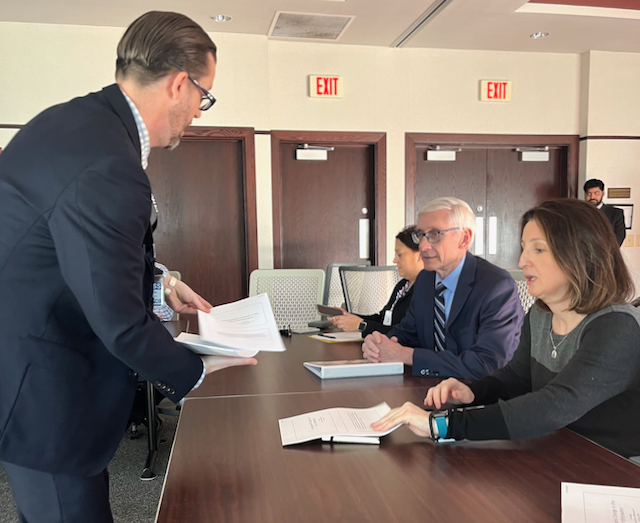By Kim McDarison
Gov. Tony Evers, along with several state officials, arrived in Whitewater Thursday to learn about area immigration patterns and, according to city officials, the impacts they are having on local law enforcement agencies.
Along with a stop at the Irvin L. Young Memorial Library, where Evers met with city officials, the governor also made a visit to Lincoln Elementary School in Whitewater.
According to City of Whitewater Chief of Staff Taylor Zeinert, Deputy Director of Political Engagement with the governor’s office Mitch Wallace contacted her to set up a “private meeting,” she noted by email, with Whitewater City Manager John Weidl and Whitewater Police Chief Dan Meyer.
In a telephone interview following the meeting, Weidl said he, Zeinert, Meyer, and Whitewater Common Council President Neil Hicks, whom he invited, arrived to meet with the state officials at 3 p.m.
Weidl said he invited Hicks to join the group with the aim of making sure that a Whitewater elected official would have an opportunity to ask questions.
“It was our elected officials who initiated the process to write the correspondence representing our challenges and I wanted an elected official to be there to ask questions and be there so the council could see the fruits of their labor,” Weidl said.
The governor arrived as part of a group of six people, Weidl said, and was joined at the meeting table by three other state officials, he added. Wallace and the Director of the Bureau of Refugee Programs with the Wisconsin Department of Children and Families Bojana Zoric Martinez, were among them, Zeinert wrote. She was unable to identify other panelists arriving with the governor.
During the telephone interview, Weidl described the 45-minute meeting as informative and productive.
He noted that about half of the meeting time was used by Meyer to make a presentation.
The presentation was an updated version of one given to members of the city council last year, created to give the body an understanding of the types of challenges the city’s police department was facing, following an influx of new community members from Central America, Weidl said.
Weidl said that the presentation made to the governor offered slides, with updated statistics, to help build an understanding of the strain that has been placed on the department’s resources.
The presentation further sought to build an understanding of the importance of proactive policing, Weidl said.
“It was designed to put facts and figures in the governor’s office about law enforcement resources and how they are increasingly strained,” Weidl said.
Additionally, he said, the panel talked about a reduction in Municipal Service Payments or MSP program resources, coupled with the dissolution of contracts with the university for dispatch services. The total impact of the loss of the two state-supported revenue sources has brought a decrease in city resources of $400,000.
According to the Wisconsin Department of Administration’s website, the purpose of the MSP program is to “make an equitable annual payment to Wisconsin municipalities from a specific state appropriation, in recognition of critical services directly provided to state agency and UW System facilities located therein during the prior calendar year.”
“The governor was aware of the programs we use, but our specific circumstances was new information,” Weidl noted.
During the discussion, Weidl said there were two areas where the state and city officials found some agreement.
One area involved taking a future look at the distribution of state-supported resources.
A second area revolved around an idea posed by the city to create an immigration liaison, Weidl stated.
The concept of a liaison that might be extended to serve at the municipal and county levels was of interest to the panel, Weidl noted, adding that a shared use of resources could be developed if the liaison functioned in a broader, more regional way.
As the state officials learned about Whitewater and its challenges, Weidl said they were engaged.
“I was pleasantly surprised by the amount of engagement,” he said, adding that the governor and the panel asked thoughtful questions.
Setting federal immigration challenges aside, he said, the panel focused on local and state-level challenges and solutions.
Weidl said a takeaway from the meeting for him was that the governor “made clear” that if city officials worked through their legislators and through use of an appropriate legislative process, he would be supportive of legislation that could help alleviate challenges brought about by local migration patterns.
Such legislative proposals brought by city officials would need to remain focused on challenges relating to migrant populations, with “zero politics — all process,” Weidl said.
The idea is to focus on “services we need,” he noted, adding: “I think our focus would be on a liaison.”
Looking ahead, Weidl said he saw next steps as taking some time to digest the discussion from Thursday’s meeting, along with time to allow he and Meyer to engage in some research. Looking at the liaison concept, he said he believed it would be beneficial for city staff to find examples of the liaison role used in other settings, which would allow he and Meyer to develop a model.
“We need to do our research, and come to the table with ideas that make sense. We need to bring to the table a model of something that works. This is step one of 56; legislation is a long road and it’s precarious,” he said.
Weidl added: “Over the next few council meetings, we will put it on the agenda and ask the council how they would like to tackle these issues logistically — if it would be something they would want to support.”
An interview with Weidl and Meyer conducted by WhitewaterWise editor Kim McDarison in January, and focusing on challenges facing the city and police department following an increase in the city’s immigrant population, is here: https://whitewaterwise.com/whitewater-police-chief-city-manger-say-city-is-safe-discuss-the-departments-condition-future/.
This story may be updated.

